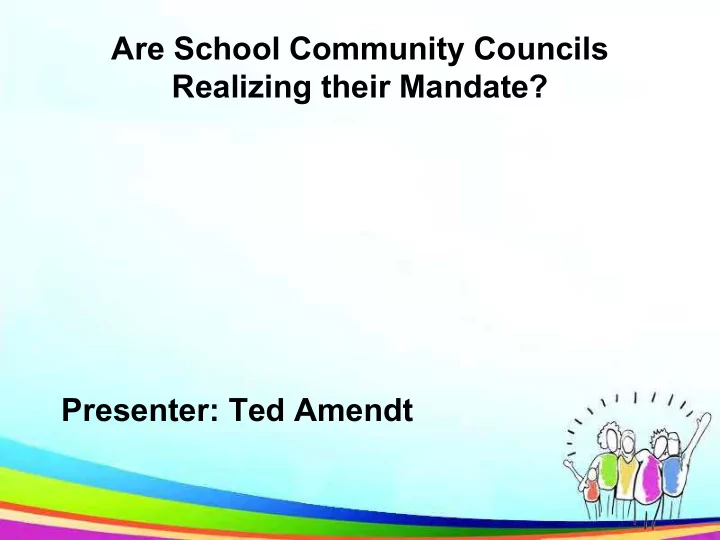

Are School Community Councils Realizing their Mandate? Presenter: Ted Amendt
What does the SCC do? • If I were to ask you what the primary role of your SCC is, what would you say it is?
What Brings Me to This? • 2016 Adopted Resolution • 20+ years in Saskatchewan’s K-12 education sector • Team member at outset of development of SCCs • SSBA employee – recently completed SCC evaluation report • PhD Candidate at University of Saskatchewan • Parent, researcher, policy-maker. Passion for family and community engagement in schools.
Historical Timeline
Historical Timeline (cont’d)
Historical Timeline (cont’d)
SCC Mandate The purpose of SCCs is to “develop shared responsibility for the learning success and well-being of all children and youth; and, encourage and facilitate parent and community engagement in school planning and improvement processes.” (Saskatchewan Learning, 2005, p. 8)
SCC Mandate The School Community Council facilitates parent and community participation in school planning, and provides advice to the board of education and the school’s staff. ( The Education Act, 1995 )
SCC Mandate In co-operation with the school staff, the SCC is to develop and recommend to its board of education for approval a school level plan that is in accordance with the board of education’s strategic plan. ( The Education Regulations, 2015 )
Interesting Facts • School council structures exist across Canada. • Nearly all have a clear mandate to support student learning and achievement. • They have varying degrees of autonomy. • There is a sense of a mandate not achieved. (Carlson 2013; Saskatchewan Ministry of Education, 2011)
SCC Evaluation • Collaborative study with the SSBA. • 120 participants: – SCC urban members – SCC rural members – School board members and Directors – Education partners and those with responsibilities for SCCs.
SCC Evaluation Findings • A Sense of a Mandate Not Achieved – “You just bake things like back in the 50’s”. (SCC member) – “There is a lack of awareness of what the mandate is.” (SCC member)
SCC Evaluation Findings • Beliefs and assumptions impact on SCCs achieving their mandate. • “Unless SCC members are former teachers, administrators, learning coaches or reading, writing or math specialists, they have a difficult time giving their input on how schools should be teaching students.” (Board member/Directors group) • “I think it is asking a lot of new immigrants to weigh in on strategic plan – they are not ready for it – it is too much for my newcomers.” (Education Partners Group) • I haven’t found that the SCC can make that goal on their own – it is driven by the school administration.” (Education Partners Group)
SCC Evaluation Findings • The Key Role of the Principal • “The administrator is the key. Our administrative team is three lovely people. The tone, attitude, acceptance of the principal to invite and engage community to be involved.” (SCC member)
SCC Evaluation Findings • Fundraising • Alice in Wonderland . Alice asks the Cheshire cat, “Would you tell me please which way I ought to go from here?” “That depends a good deal on where you want to get to,” the cat tells her. “I don’t much care,” Alice says. “Then it doesn’t matter which way you go,” the cat replies.
SCC Evaluation Findings • Providing Adequate Supports, and Creating New Supports for SCCs • Supports are in place, however, these are inconsistent across schools/school divisions. • A division-wide forum for SCCs to network and engage with the board of education and senior school division officials.
SCC Evaluation Findings • Making the SCC an Inviting Structure • 2011 Evaluation – SCC structure “too intimidating.” • Acknowledgement that the perception remains that the SCC is too intimidating for some parents, particularly Indigenous and newcomers.
Table Dialogue • What’s your reaction to the findings? – SCCs are not focused on their mandate. – Beliefs and assumptions about SCCs. – Key role of the Principal. – Fundraising – Adequate supports for SCCs? – SCCs “too intimidating”.
The Role of Boards • At your tables please discuss. – Direction: What can boards of education do to re-focus SCCs on their mandate? What supports are required? – Control: What do boards of education require to gain reasonable assurance that SCCs are delivering on their mandate?
Things to Pay Attention To • Switch business approach to partnership approach (Bryan & Henry, 2012; Henderson, Mapp, Johnson & Davies, 2007). • Develop trust and relationships. • Examine beliefs and assumptions when it comes to engaging families and communities (Pushor & Amendt, 2018; Kirby & DiPaola, 2011).
Closing • Questions??? • Something you are taking away … • Thank You!!
Presented By Ted Amendt, PhD Candidate College of Education University of Saskatchewan tamendt@saskschoolboards.ca 306-569-0751 ext. 141 https://saskschoolboards.ca/wp- content/uploads/SCC-Evaluation-Research- Report.pdf
Recommend
More recommend